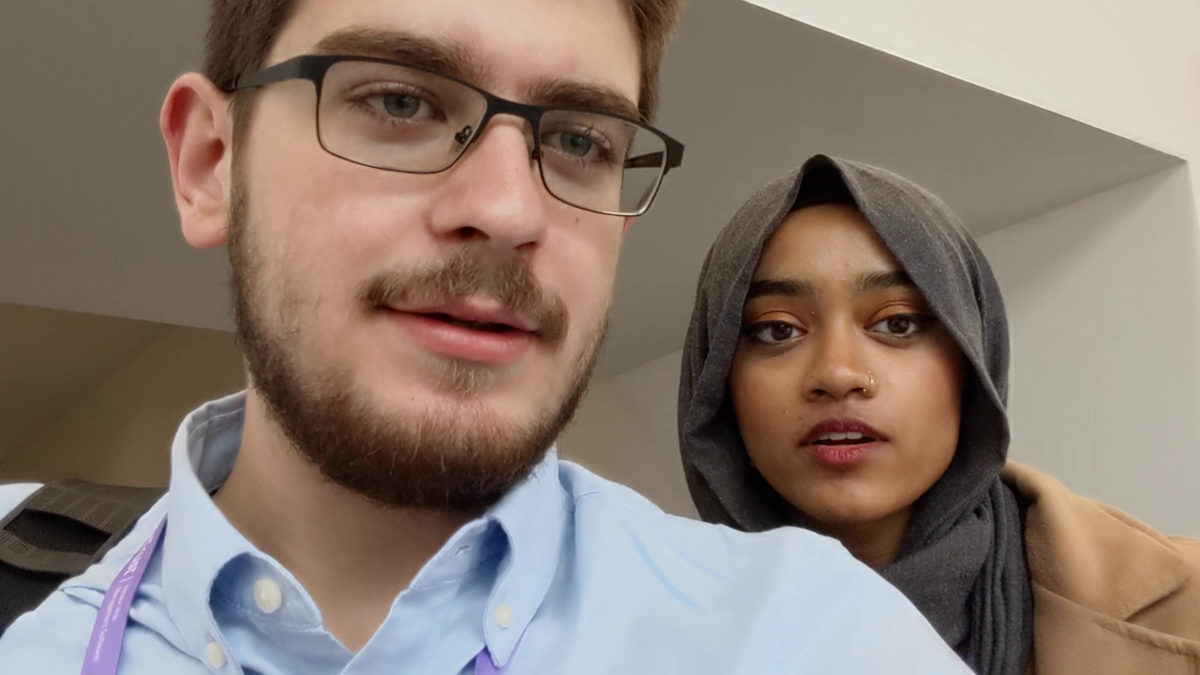ASU students attend world-renowned cybersecurity conference

Security Scholars vlog at that RSA conference. Photo courtesy of Muhammed Kilig
Last month, more than 50,000 cybersecurityThe name RSA refers to the public-key encryption technology developed by RSA Data Security, Inc., which was founded in 1982. professionals from around the globe converged on San Francisco to attend the world’s preeminent cybersecurity gathering, the RSA Conference. Among the crowd were two ASU undergraduate students, Muhammed Kilig and Raida Khan, both computer science majors in the Ira A. Fulton Schools of Engineering. Kilig and Khan were invited as 2018 RSAC Scholar recipients with all travel and registration costs covered by the conference.
As outstanding ASU cybersecurity students, they were chosen to attend this year's conference, where they learned from leading cybersecurity experts and were given access to a network with more than 600 companies to make connections for their futures.
“It’s like every corner you turn in this whole conference is an opportunity,” Khan said. “We connected with the first female chief information security officer for the White House, and she said, ‘Come meet me, we’ll talk,’ and we did!”
Conference speakers ranged from the FBI director to actress Helen Mirren. “The final keynote was by Tina Fey. We’re like speechless … for all the stuff we’ve gotten to do,” Kilig said.
Each year the RSAC sponsors outstanding students to attend the conference through the RSAC Security Scholars program. Only a handful of universities were selected to offer the RSAC Scholars program to their students. ASU was one of the first schools to be included in this program, which is administered by the Cybersecurity Education Consortium (CEC) and the New College of Interdisciplinary Arts and Sciences. Students across ASU have the opportunity to apply to be selected as RSAC Security Scholars and attend the weeklong conference completely free of charge. They are invited back in subsequent years, and their conference registration is waived, allowing them to meet the next cohort of scholars and rejoin the fellow scholars from their cohorts. Students interested in applying next year may visit the CEC website for more information.
Follow the CEC on Twitter to see more about Kilig and Khan’s experience at the RSA Conference.
More Science and technology

ASU and Deca Technologies selected to lead $100M SHIELD USA project to strengthen U.S. semiconductor packaging capabilities
The National Institute of Standards and Technology — part of the U.S. Department of Commerce — announced today that it plans to…

From food crops to cancer clinics: Lessons in extermination resistance
Just as crop-devouring insects evolve to resist pesticides, cancer cells can increase their lethality by developing resistance to…

ASU professor wins NIH Director’s New Innovator Award for research linking gene function to brain structure
Life experiences alter us in many ways, including how we act and our mental and physical health. What we go through can even…